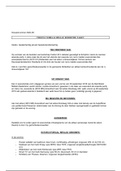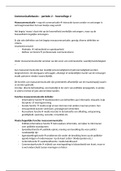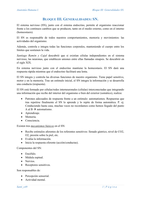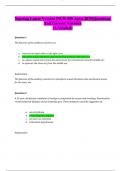Notas de lectura
GENERAL GEOLOGY
- Grado
- Institución
Lecture notes of 4 pages for the course GEOGRAPHY 1000 at 123 University (GENERAL GEOLOGY)
[Mostrar más]Vista previa 1 fuera de 4 páginas
Vista previa 1 fuera de 4 páginas
Algunos ejemplos de esta serie de preguntas de práctica
1.
what is geology?
Respuesta: geology is the study of form and structure of earth
2.
define plate collision?
Respuesta: in past eras different major events place on universe and its earth.after a long term and duration time ago,plate collides and separated due to movement of earth and its forces acting on it.some plates now going far and some are coming close too each other
3.
explain indian plate ?
Respuesta: The India Plate or Indian Plate is a tectonic plate that was originally a part of the ancient continent of Gondwana from which it split off, eventually becoming a major plate. About 55 to 50 million years ago it fused with the adjacent Australian Plate. It is today part of the majorIndo-Australian Plate, and includes most of South Asia – i.e., the Indian subcontinent – and a portion of the basin under the Indian Ocean, including parts of South China and Eastern Indonesia,[1][2][3] and extending up to but not including Ladakh, Kohistan and Balochistan.
4.
introductio too CARBONATE SHELF EVOLUTION-RESPONSE TO SEA LEVEL
Respuesta: The major difference in patterns of shelfal evolution in siliciclastic systems versus carbonate-dominated systems again lies in sediment source. In siliciclastic settings, the shelf is fed at the shoreline, and gross shelfal architecture through time is marked by distinct coastal onlap and offlap that correspond to fluctuations of sea level (Vail and Hardenbol, 1979), by changes in the rate of sea level fluctuation, and by the availability of sediment coming into the system, as driven by source area climate and tectonism (Pittman, 1978).
5.
2004 Indian Ocean earthquake
Respuesta: The 9.1-9.3 moment magnitude 2004 Indian Ocean earthquake was caused by the release of stresses built up along the subduction zone where the Indian Plate is sliding under the Burma Plate in the eastern Indian Ocean, at a rate of 6 cm/yr (2.5 in/yr). The Sunda Trench is formed along this boundary where the Indo-Australian and Eurasian Plates meet. Earthquakes in the region are either caused by thrust faulting, where the fault slips at right angles to the trench; or strike-slip faulting, where material to the east of the fault slips along the direction of the trench

Compradores de Stuvia evaluaron más de 700.000 resúmenes. Así estas seguro que compras los mejores documentos!

Puedes pagar rápidamente y en una vez con iDeal, tarjeta de crédito o con tu crédito de Stuvia. Sin tener que hacerte miembro.

Tus compañeros escriben los resúmenes. Por eso tienes la seguridad que tienes un resumen actual y confiable. Así llegas a la conclusión rapidamente!
You get a PDF, available immediately after your purchase. The purchased document is accessible anytime, anywhere and indefinitely through your profile.
Nuestra garantía de satisfacción le asegura que siempre encontrará un documento de estudio a tu medida. Tu rellenas un formulario y nuestro equipo de atención al cliente se encarga del resto.
Stuvia is a marketplace, so you are not buying this document from us, but from seller waituntilshinewait. Stuvia facilitates payment to the seller.
No, you only buy this summary for $5.39. You're not tied to anything after your purchase.
4.6 stars on Google & Trustpilot (+1000 reviews)
45,681 summaries were sold in the last 30 days
Founded in 2010, the go-to place to buy summaries for 15 years now




